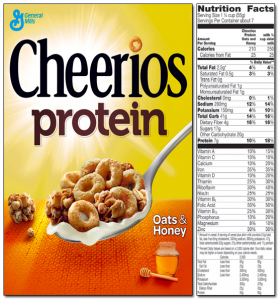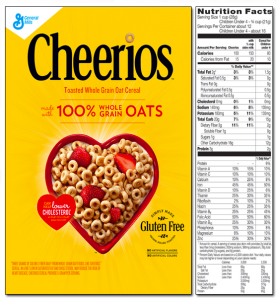Cheerios for Protein?
I laughed when I first saw the Cheerios box advertising Protein. Protein is hardly an issue in U.S. diets—most Americans consume twice what they need—so this is clearly a marketing ploy.

Center for Science in the Public Interest (CSPI), however, was less amused. Its scientists did the math and compared the protein to the amount in regular Cheerios. They also looked at serving sizes.
- Cheerios Protein: Protein 7 grams, Serving Size 55 grams
- Cheerios regular: Protein 3 grams, Serving Size 28 grams
Hmm. Not much difference, is there?
CSPI filed a formal complaint.
General Mills falsely and misleadingly markets Cheerios Protein to children and adults as a high protein, healthful alternative to Cheerios. In fact, Cheerios Protein has only a smidgen more protein per serving than Cheerios, or 4 grams, which is only 5% of the average American daily protein intake. Most of that 4 grams is attributable to differences in serving sizes: Cheerios Protein has a bigger, 55 gram serving size, whereas Cheerios uses a 27 gram serving size. Two hundred calories’ worth of Cheerios Protein has a mere 7/10th of a gram more of protein than 200 calories’ worth of Cheerios.
Even worse, they looked at sugars.
- Cheerios Protein: 17 grams sugars
- Cheerios regular: 1 gram
As CSPI puts it:
Rather than protein, the principal ingredient that distinguishes Cheerios Protein from Cheerios is sugar. Cheerios Protein has 17 times as much sugar per serving, as Cheerios, which General Mills does not prominently disclose. 8. General Mills charges a price premium for Cheerios Protein.
Oops.
Buzzfeed has a good discussion of this.
Caveat emptor (I seem to be saying this a lot lately).

